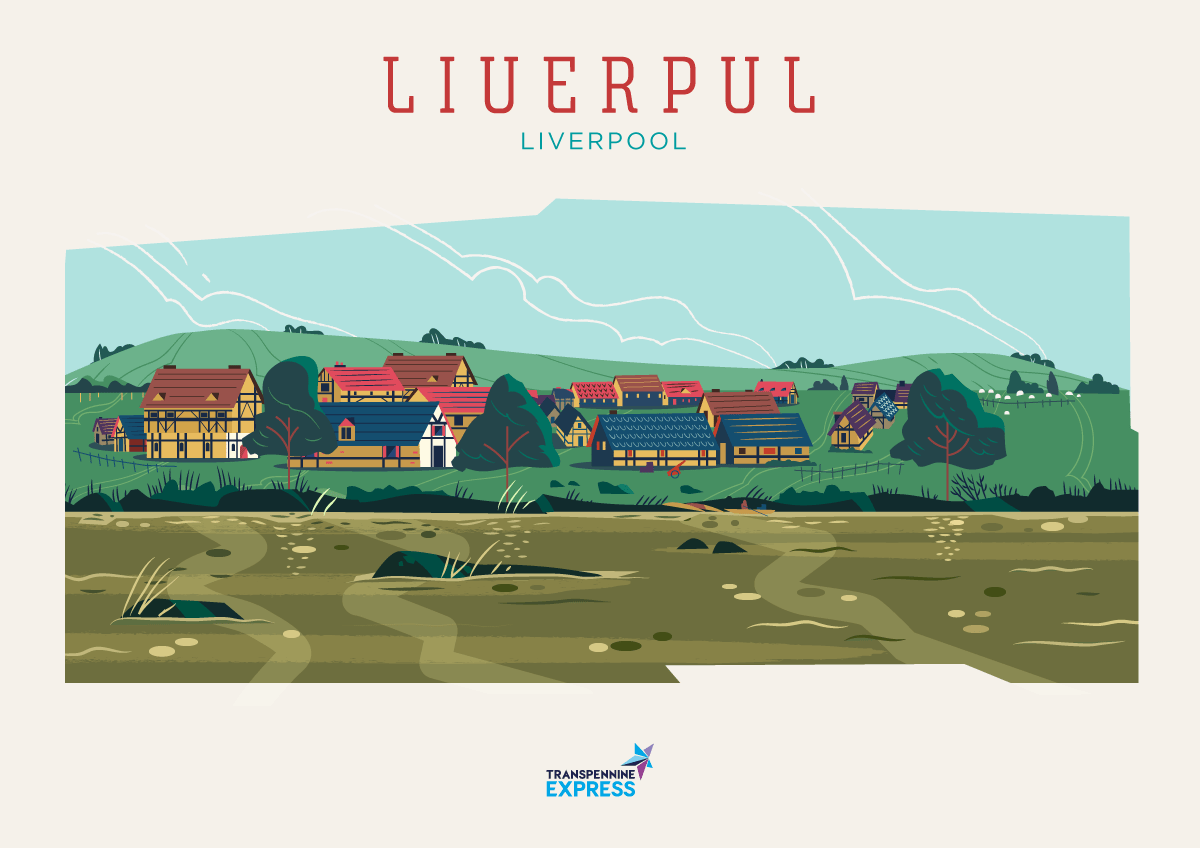TransPennine Express has released information on how some of the Northern cities got their names.
Back in Medieval times, the North of England was a violent place with battles taking place. Both the Celts, the Anglo Saxons and the Romans were conquering, dividing and taking the country for their own.
Yet across the centuries and up until now, their influence remains through their language. Whether that's the Romans in Manchester, the Vikings in York and the North East Coast, or the Celts in Scotland and Cumbria, their legacy still lives on today.
The train operating company has delved into the archives and are looking at the history of the 10 northern towns and cities, and here's how they got them names.
1. LIUERPUL (LIVERPOOL) – MUDDY CREEK
The Mersey is synonymous with Liverpool and it seems the river even had an impact on the city's original moniker.
The name Liverpool can be traced way back to 1190 when it was called Liuerpul, which means a ‘pool or creek with muddy water'.
This meaning might not inspire thoughts of today's hustle and bustle of the city, but it resembles the humble beginnings. Over the years it has evolved through many different spellings but has stayed true to its origins.
The pool that contained muddy water is thought to refer to the inlet that still flows into the Mersey today.

2. GLASGU (GLASGOW) – GREEN VALLEY
The early Gaelic name of the city was first Glaschu or the Cumbric glas cau which is believed to mean “Green Glen” or “Green Valley”.
However, it wasn't until 1116 that the modern name Glasgu began to appear when a community was established in a settlement and a church was built.
This happened with the arrival of Saint Kentigern, also known as Mungo. The ancient site of the chapel is where the current cathedral stands, built in the 12th Century and dedicated to St. Mungo.
3. MAMUCIUM (MANCHESTER) – BREAST-SHAPED HILL
Manchester has its roots firmly in the time of the Romans, which is reflected in its early name.
It's thought it was named in the 1st Century, around AD 78-86, following the creation of a small fort on top of an outcrop at the convergence of the River Irwell and River Medlock.
The name Mamucium means “breast-shaped hill” and is a Latinised form of the Celtic meaning.
This is fitting as the fort was used by the Romans to defeat a local Celtic tribe.
4. DIN EIDYN (EDINBURGH) – FORT OF EIDYN
Many believe the name of the city to translate simply as “Castle Rock”, with many people visiting saying its easy to see why it fits so well.
However, in 600 AD Edinburgh was actually referred to as Din Eidyn, which is said to mean “fort of Eidyn” which is a specific kind of Celtic hill fort.
What was once up for a little deliberation was whether Eidyn was in fact a reference to Edwin and directly related to the 7th Century King Edwin of Northumbria. This has now been disproved by local historians with it questionable as to whether Edwin ever made it this far north to give him his name to Edinburgh.
5. LADENSES (LEEDS) – PEOPLE OF THE FAST-FLOWING RIVER
The inaugural title of the city is still a little up for debate. In some circles, the first designation was Loidis, which was then changed to Ledes.
The latter is how it was referred to in the Domesday Book after the Norman invasion. F
Others believe, the original name to be Ladenses which is a Celtic term for “people of the fast-flowing river”; quite different from Leeds!
6. STOC-PORT (STOCKPORT) – WOODEN CASTLE
Sometimes the simple names make the most sense. Take Stockport for instance, which quite literally translates to “a castle in a wood”.
The original settlement was Saxon and was situated on a cliff overlooking the River Mersey. It was an important spot where a number of Roman roads met and crossed the river.
7. SHETH-FELD (SHEFFIELD) – FOREST CLEARING
The city's initial name is Old English or Anglo Saxon and is thought to date back to the arrival of the Anglo Saxons in this part of the country. This could be anywhere between the 6th and the 9th Century.
The name itself derives from the River Sheaf, with sheaf being a corruption of shed or sheth meaning to “divide” or “separate”.
8. SKARÐABORG (SCARBOROUGH) – SKARTHI'S STRONGHOLD
While York takes most of the Viking credentials, Scarborough had an important role to play too. It was christened as Skarðaborg in 966 AD by a Viking raider called Thorgils Skarthi.
Having defeated the Anglo Saxons to take over the settlement, Skarthi couldn't resist a show of personal strength and vanity by naming it after himself.
9. PEN RITH (PENRITH) – RED TOWN
Now this one is still often called into question. Of all the towns and cities on TransPennine Express' list, the origin of the name Penrith is still a little foggy.
For many it is thought to come from either the Celtic words “penn” and “rid” which means “hill ford”.
10. JÓRVÍK (YORK) – HORSE BAY
Anyone who's spent any time in York will know there is a heavy Viking influence on the area. In fact, the Vikings defeated Anglo Saxon rule in 865 AD and took not just the land, but its name too.
The primary Anglo Saxon title was in fact Eoforwic which is thought to translate to “wild boar settlement”.
Now that TransPennine Express has dug out information surrounding the names and how they got them, why not book a ticket to start your adventure to one of these places that are surrounded in history. Click here to start your adventure.
Where Next?
News Homepage
For the Latest Railway News
RailAdvent Online Shop
Framed Prints, DVD's / Blu-Ray's and more
LocoStop Community
Come and share your railway pictures
TransPennine Express
Visit their website